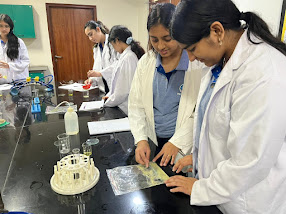Objective of the Learning Engagement: Students will be able to have hands on experiment practice on DNA extraction and use appropriate scientific terminology for communication.
Details of the Learning Engagement:
Grade 10 students got to see and hold in their hand the substance they have been studying that seems so abstract and hard to believe it even exists- The DNA!! Blueprint for an organism’s growth and development. Students were able to present their DNA extraction results and insights to the class, using appropriate scientific terminology and clear communication skills. They had to explain how DNA extraction techniques are relevant in fields such as forensic science, genetic research, and biotechnology. Most importantly, they could describe the role of detergent in breaking down cell membranes, the function of salt in precipitating DNA, and the use of alcohol to isolate DNA strands.
Impact of the engagement on students and my reflection as a teacher:
Engagement and Interest: Hands-on experiments tend to capture students' attention and interest more effectively than traditional lectures. The unique and tangible nature of the DNA extraction process, especially from a common fruit like a banana, sparked curiosity and enthusiasm among students. This experiment provided students with a concrete example of the abstract concept of DNA, helping them visualize and understand that DNA exists within living organisms.
- Varsha Kumar




Nice to see students engaged in the experiment. Student's retention and critical thinking skills are always enhanced when such learning experiences are planned for them.
ReplyDelete